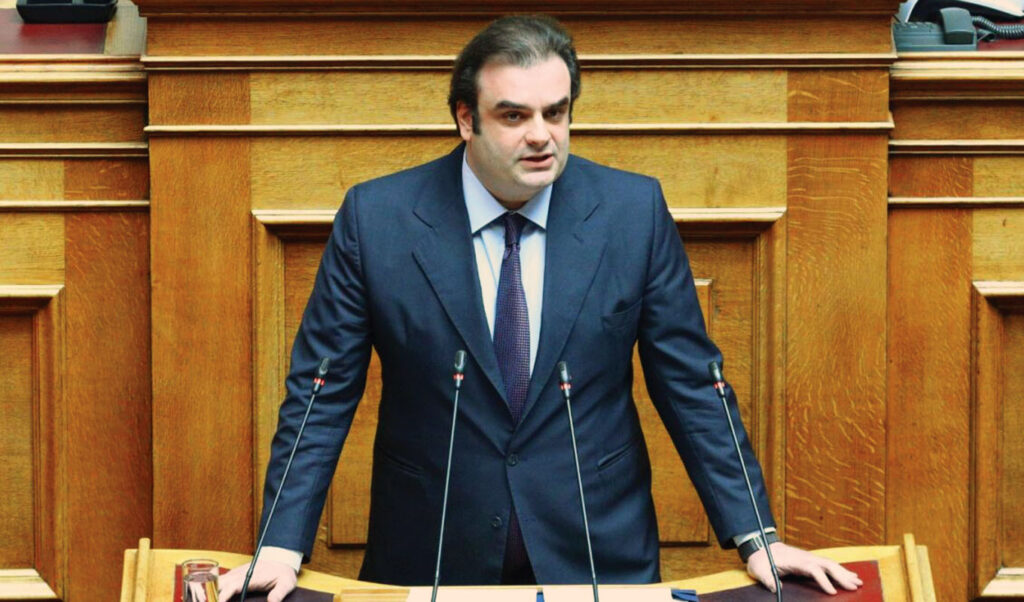Finance Minister Kyriakos Pierrakakis spoke about the new salary increases for security forces and when beneficiaries will see these increases. He emphasized that when the 2024 increase of €70 monthly, family allowances and special conditions allowance are combined with the announced increases for 2025 and 2026, the cumulative rise in security forces’ salaries exceeds €300 monthly.
“The increases take effect from the October payroll. Security forces will see them in their accounts in the coming period, after the law is passed and as soon as possible, depending on the ability of the Corps’ financial services to complete procedures in time. In any case, everyone will receive the amounts retroactively from the start date,” the Finance Minister declared in an interview with lawandorder.gr.
Kyriakos Pierrakakis: Detailed interview with the Finance Minister on security forces salary increases
Minister, the compensation for night work for security forces increased by 20% from 1.1.2025 and reaches €3.33 per hour. However, this is unhealthy and hard work, under conditions of high prices and inflation. Many security personnel call it “crumbs.” Is there intention for a more substantial increase?
From January until today, substantial interventions have been made to support Security Corps personnel. Interventions that practically recognize the difficulty, danger, and importance of their mission. From July 2025, the Hazard Pay Allowance of €100 monthly is being paid. At the same time, at the Thessaloniki International Fair, the Prime Minister announced the new salary scale for Police, Fire Service, and Coast Guard, providing average additional increases of around €110 monthly, while for personnel with many years of service, the amount exceeds €200 monthly.
Those serving in Security Corps will also benefit from the new tax reform, implemented from January 1, 2026. A couple with €20,000 income each and two children saves €1,200 annually, while with three children the benefit reaches €2,600. Additionally, young police officers, coast guards, and firefighters up to 25 years old will have zero income tax, while for those up to 30 years old, the rate is limited to 9%. Furthermore, there will be an additional increase in April, proportional to the minimum wage increase.
Supporting people serving on the front line of security is our steady choice. Because citizen safety and recognition of those who ensure it constitute the foundation of a just and strong society.
You said the new salary scale provides increases of €100 to €200. However, security forces’ real losses over the past decade exceed 30%.
These aren’t the first increases made. This government unfroze public sector salaries after 14 years. Let’s recall the 2024 horizontal increase of €70 monthly, accompanied by increases in family allowances and special conditions allowance. If you add the 2025 and 2026 increases I mentioned, cumulatively the rise in Security Corps salaries exceeds €300 monthly.
Is the new salary scale truly a restoration of injustices or an accounting adjustment?
It’s a fair reform. It corrects chronic injustices and rationalizes salaries in a simple, clear, and predictable way.
Now, basic salary is linked exclusively to years of service, with 20 common scales for all Corps, while each member’s rank is reflected through an increase coefficient, from 1.00 to 1.23. Thus, every security officer knows exactly how their salary will evolve throughout their career and will receive increases both based on years of service and rank progression.
For example, a 25-year-old Police Sub-Inspector B with 4 years of service will receive a gross monthly salary increase of €115, from €1,515 to €1,630. Their net salary, considering the significant income tax reduction in January 2026 for young people up to 25, increases from €1,100 to €1,300, meaning a €200 monthly increase.
A 42-year-old Chief Constable with 20 years of service will receive a gross monthly salary increase of €146, from €1,775 to €1,921.
This change affects over 75,000 Security Corps personnel and the fiscal impact exceeds €121 million annually. It’s an investment in recognizing people who are daily on the front line.
The new salary scale is based on unified scales and rank coefficients. What guarantees that distortions or injustices won’t be created again?
That’s precisely the central point of the new salary scale – it definitively ends past distortions. Previously, there were different rates of salary progression. Someone could remain for many years at the same salary scale, and the relationship between salary scales, years, and rank wasn’t linear.
Today, everyone advances with steady steps. Every two or three years, depending on years of service, they move to the next scale and receive automatic salary increases, as well as increments when promoted to higher ranks. Additionally, the Position of Responsibility Allowance increased significantly, from 25% up to 100%, with amounts reaching up to €600 for Corps Chiefs and €400 for senior officers. This recognizes management responsibility and their role’s gravity.
When will they see the money in their accounts?
The increases take effect from the October payroll. Security forces will see them in their accounts in the coming period, after the law is passed and as soon as possible, depending on the ability of Corps financial services to complete procedures timely. In any case, everyone will receive amounts retroactively from the start date. This applies to all Security Corps: Police, Coast Guard, and Fire Service.
The Border Allowance of €130 applies only to specific services in ten northern Greece prefectures. Doesn’t this create unfair division?
The Border Allowance was a years-long request from police officers and we tried to find money to satisfy it. It’s granted with objective, geographical, and operational criteria, based on border proximity, proportional to what applies to forward units in the same areas of the Armed Forces. Beneficiary selection will be decided by the Chief of Hellenic Police, who knows the real conditions best.
Mr. Dendias proceeded with rationalization in the National Defense Ministry, with adjustments and corrections to the Military salary framework. Why, in your opinion, haven’t the responsible ministries of the three Security Corps made similar rationalizations – namely Citizen Protection, Maritime Affairs and Island Policy, and Climate Crisis and Civil Protection?
A Finance Minister must always pursue comprehensive and fair rationalization across the entire public sector. However, this must be done with realism and respect for each sector’s particularities.
In the Armed Forces, Mr. Dendias indeed proceeded with rationalization in the best way, considering the military’s modern needs and the intense personnel exodus in recent years. The new Armed Forces salary scale attempts to stem this exodus wave, while our joint effort with the National Defense Ministry to quadruple military academy students’ salaries, from €150 to €600, is a clear indication of this support strategy.
Security Corps started from a very different starting point, with chronic deprivations in technical infrastructure, staff shortages, and financial losses that first needed restoration. Now that the situation is stabilizing, there’s space to proceed with more comprehensive rationalization aiming for a unified, transparent, and modern framework for all serving in the country’s security and defense.
You’re a technocrat with digital governance experience. How do you plan to “digitize” the economy without losing the human dimension?
Technology isn’t an end in itself; it’s precisely a tool to make the state more human. At the Digital Governance Ministry, we saw that when you simplify procedures, you don’t distance citizens – you bring them closer. The same applies to the economy. When citizens avoid bureaucratic hassle and businesses can pay VAT or get funding without getting lost in red tape, then the state stops being an obstacle and becomes an ally.
Technology, for me, has value only when it improves people’s lives. That’s the great challenge – transforming data and systems into policies with human impact.
If you could implement only one measure in 2026 to improve citizens’ living standards, what would it be?
What we’ve already announced: A tax change supporting the middle class and attempting to address the demographic problem, which is the country’s biggest issue. This reform touches it from many angles. It supports families and young couples, strengthens the elderly by abolishing personal difference, relieves the periphery by abolishing ENFIA, and gives relief to border islands by reducing VAT. It’s a policy embracing all of Greece, from Kastellorizo to Kastoria. When tax policy becomes a tool of social cohesion, it’s not just about numbers – it’s about the country’s very prospects.




